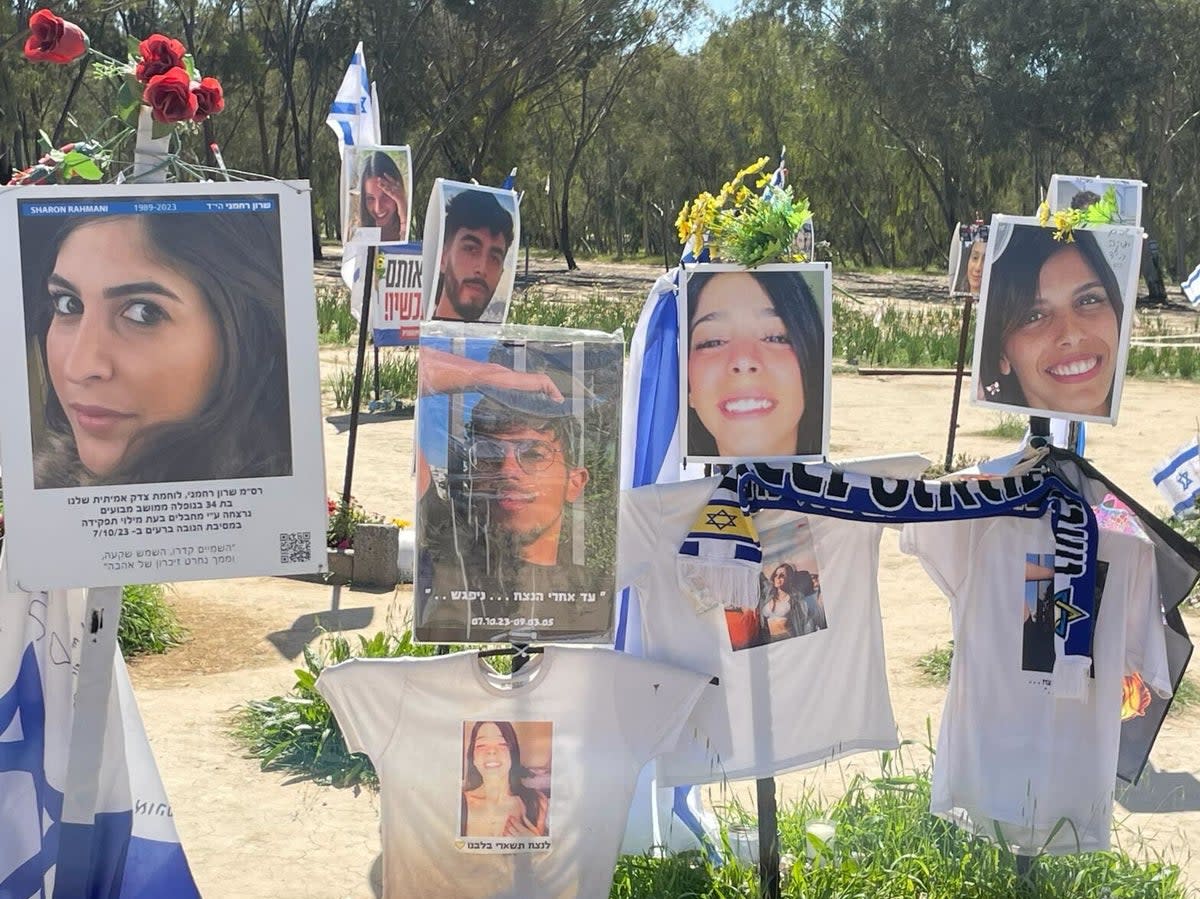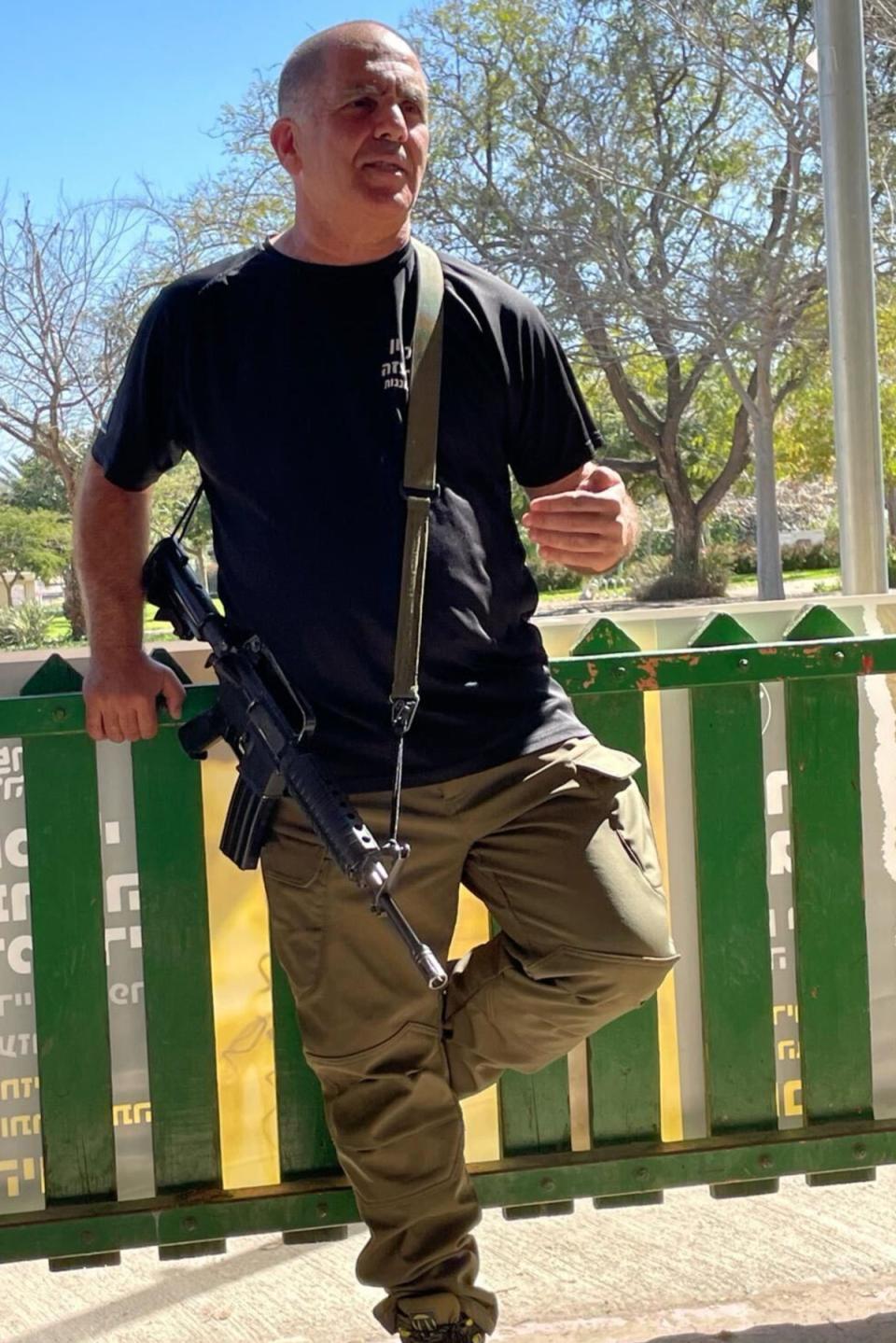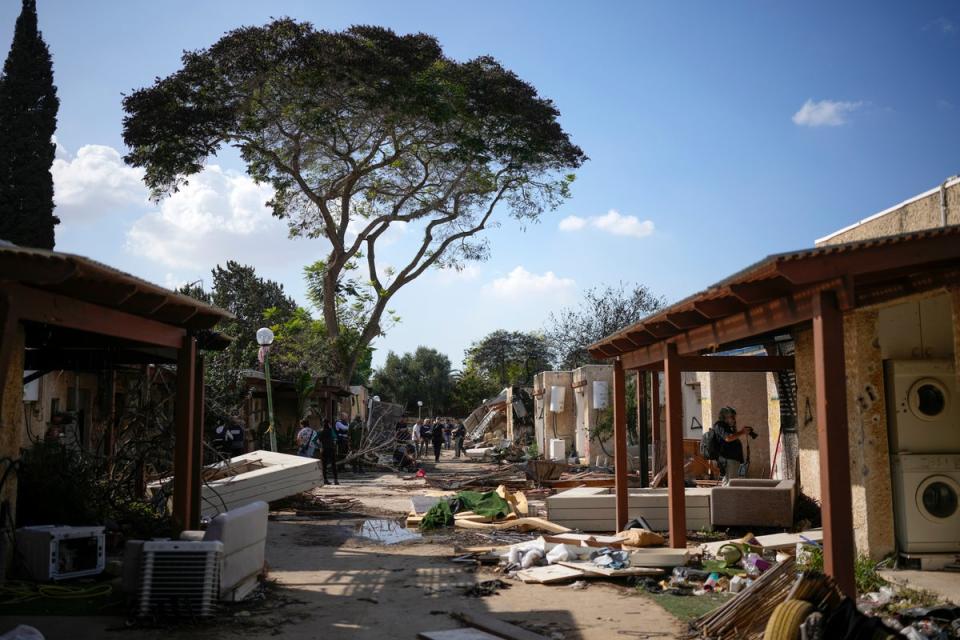In an Israeli kibbutz attacked by Hamas they want two things: Their kidnapped loved ones home and peace

They were the scenes of the two worst atrocities Hamas carried out during their lethal raid into Israel. More than 415 children, women and men were slaughtered, another 60 were taken hostage, some of them to die in captivity.
The fields where the Re’im music festival took place, and the Kfar Aza kibbutz, have become shrines, five months on, to that dark day. The scars of what happened, the burned and shattered buildings, the places where residents fell, are preserved for people from home and abroad, to pay their respects.
The attacks on 7 October unleashed a savage conflict, which has become the centre of international attention with an intense search for a ceasefire to end the carnage. More than 30,000 people have been killed in Gaza, according to the Hamas-affiliated Palestinian Health Authority and there is a desperate need to get international aid to the 2 million people trapped in the territory.
Talks in Cairo for a temporary end to the fighting, and an increase in humanitarian supplies as Ramadan approaches, appear to have reached an impasse after Israel accused Hamas of making impossible demands over a ceasefire and refused to send a delegation to the meeting.
Meanwhile, cross-border firefights between Israel and the Lebanese Hezbollah militia, allies of Hamas, have continued to escalate, with Israel’s defence minister, Yoav Gallant, warning that a “critical point” is being reached for large-scale military operations to be authorised.
While the world’s focus is on Gaza, there is frustration among many Israelis that what was suffered in the Hamas assault is fading away from memory abroad. They want to remind nations that 1,200 are dead, bodies were mutilated and 130 of the 240 abducted are still not free.
There is a sense of vindication that a UN report regarding allegations of appalling sexual abuse that have not, claim the Israelis, been treated with the concern and condemnation it deserved from the international community, has just concluded that there is “convincing information” that hostages still held in Gaza have been subjected to rape and torture. It also found “reasonable grounds to believe” sexual violence, including gang rape, took place on 7 October.
Israeli soldiers, police officers and civilians, as well as coachloads of visitors from abroad on “solidarity missions”, were visiting Re’im and Kfar Aza on a day of golden sunshine and pale blue skies this week. Echoes of artillery rounds – howitzers and mortars – came at regular intervals. Israel has yet to achieve the goal proclaimed by prime minister, Benjamin Netanyahu, of eliminating Hamas.

“That sounds awfully close,” says an American woman clutching her husband’s arm. “Well we really are very close to Gaza,” he says, patting her hand. “It’s outgoing – I think.” By cruel irony, the bulk of the Hamas attacks had taken place in kibbutzes and communities of people who chose to live near the border, many of whom had been advocating peace and working to alleviate the plight of the Palestinians.
Zohar Hspak is among those at the kibbutz who feel rage at what they consider a betrayal. “People here were left-wing, they were left-wing activists. I was among them, we were the ones who took people to hospitals, the families, the children of Gaza to hospitals in Israel,” he says.
“We understood that peace is a long-term aim, it takes many years of investment. But what we were trying to do was to send a message of hope to the younger generation. We wanted to create a dialogue so that we would see each other differently, they would look at Jews differently and see a different future.”
How does he feel about people about the people suffering from the Israeli onslaught in Gaza now? “I feel nothing, nothing. They have to deal with what is happening themselves, happening to their children. We are looking after ours, I’ve a grandson who is suffering from psychological issues. I know a family, a mother, father, daughter who were in a medically induced coma for three weeks,” he says.
“There were conflicts in the past when we felt sorry for what happened to people in Gaza. But this time, after the barbarity, I feel nothing. It was not just Hamas, after that came civilians, including women and children who came to loot, they took everything.”
Hspak, 58, a lawyer by profession who is a retired prosecutor with the police force, is collating evidence that Israeli human rights groups are producing for the International Criminal Court (ICC) in the Hague.

“We have heard that bodies and body parts were stolen, I have not seen this myself, but it’s what we have heard,” Hspak says. No evidence has been produced by the Israeli government to back up this claim.
“Everything we find we shall give to the courts. That is the only dealing I have with Gaza now, collecting evidence,” he adds.
Dekel Eylan’s family were advocates for peace as well and had friendly relations with their neighbours in Gaza. “We used to joke that my mother was so far to the left that she would find no one if she looked to the left,” he reflects. “I can’t remember in my life when she wasn’t working for peace. All our family felt the same way, we wanted a solution to the wars.”
Nothing would be the same for the family after 7 October, says the 41-year-old. His brother Tal, one of the first responders at the kibbutz, was killed in combat against Hamas fighters.
“I remember my last WhatsApp messages with him, it was at 7.08am. I didn’t call him after that, just in case I distracted him by doing that, and something bad happened at that moment,” Eylan recalls. “We were in the ‘safe room’ in our house for 22 hours. At the end we managed to leave. There was still fighting going on, there were dead bodies of soldiers, of terrorists, of civilians.
“We did not talk about Tal at all during that Sabbath. We did not mention his name. It was very difficult: my children were very fond of their uncle. We waited to hear what had happened to him, then we heard the news...” His voice trails away.
Tal Eylan left behind children aged 10, 14 and 15. Dekel says: “We need to look after them, keep them safe, then we need to rebuild this place, get people back here, we are concentrating on that. We have to get our people back from Gaza, we are thinking about the families of those people.”
Sharone Lifschitz’s two elderly parents were kidnapped from their home In Nir Oz, near Kfar Aza. Her 85-year-old mother, Yocheved, was freed at the end of October, but her father Oded, 83, still remains a captive.

Yocheved Lifschitz had been a soldier and then a journalist. He had reported from Gaza, met the Palestine Liberation Organisation (PLO) leader Yasser Arafat, and had campaigned long for justice for Palestinians and a Palestinian state.
“I saw this morning in an opinion poll that 57 per cent of the Israeli population believe that we should now have a long ceasefire of 120 days and get the hostages home,” says Sharone. “I think peace is what we wish for in our hearts. People deserve to live in peace, bring up their families with security and hope.
“My father found it very possible to reconcile the idea of Zionism in a progressive, socialist way with the ideas of seeking peace with their neighbours, and literally our neighbours that are a mile away from door to door. He wrote a column in 2019 in which he said that when the Palestinians have nothing to lose, we lose big time. And I think it’s our duty to show a way towards coexistence towards long-term diplomatic agreements.
“We loved sitting in our balcony and looking over Gaza. We would hear the call to prayers from mosques across the fields. Sometimes, during the conflict, we would see Gaza getting bombed, that was very, very sad," she adds.
“I am not trying to minimise what Hamas did. We know people who were killed. I know someone who died after having his genitals cut off, someone I have known all my life. My former schoolteacher was murdered, and the execution was filmed for Facebook,” Sharone says. “But we need to move forward, we need to make sure this never happens again.”
Lifschitz was speaking at the headquarters of the Hostage and Missing Persons Forum, which was formed within 24 hours of the 7 October attacks, and has been tireless in striving to bring their loved ones home.
The group, supported by distinguished people in Israeli public life, has repeatedly clashed with the government who they have accused of not doing enough to free the hostages. There have been wider claims that Netanyahu is prolonging the conflict to delay the investigations his administration will face over the catastrophic intelligence failure that led to the Hamas attack.
Netanyahu has been accused by his critics of buttressing Hamas as a way of undermining the Palestinian Authority and sabotaging the chances of a Palestinian state being created. Lifschitz says: “My father was horrified by the state of Israel supporting Hamas in various ways. He did not tolerate religious fanaticism, not in his own people, not in our neighbours.”
Questions about what happened on 7 October, and how it was allowed to happen, will not go away in Israel. Zohar Hspak, at Kfar Aza, says: “There was a contract between the state and the people. We kept to our contract, we will look to see if the state kept its contract to keep us secure.”


